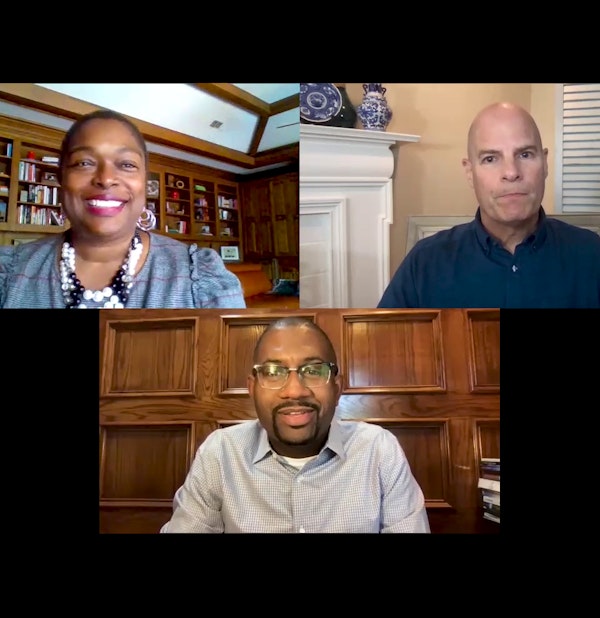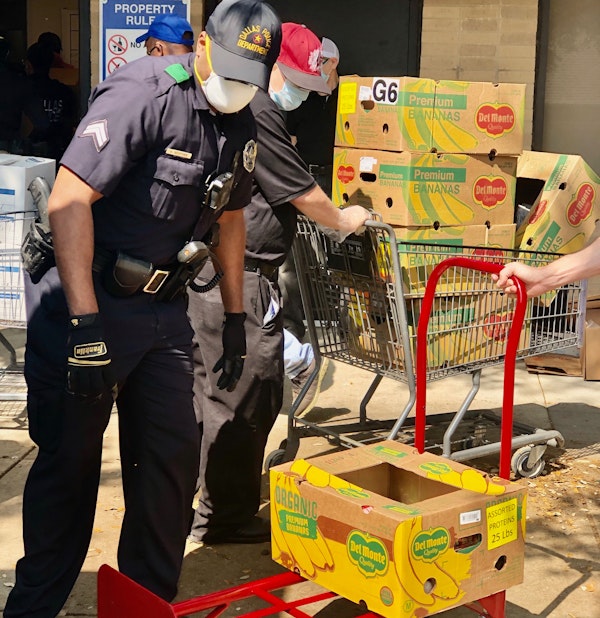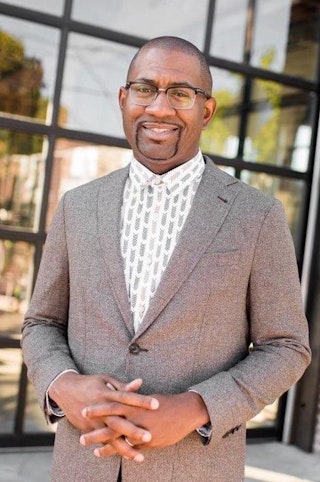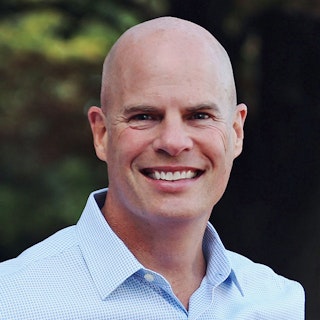Swapping Pulpits and Healing the Community
As communities turn to faith for comfort and guidance, Pastors Carter and Warren discuss the ways churches are trying to help heal — and how they’ve seen people unite to help each other.
 Clockwise from upper left: Rhonda Houston, Pastor Jeff Warren, and Pastor Bryan Carter
Clockwise from upper left: Rhonda Houston, Pastor Jeff Warren, and Pastor Bryan Carter
Pastor Bryan Carter of Concord Church and Pastor Jeff Warren of Park Cities Baptist Church are no strangers to bringing the community together. As racial tensions rose across the nation, particularly after the 2014 shooting of Michael Brown and riots in Ferguson, Missouri, the two pastors decided to swap pulpits to help bring racial reconciliation to their city of Dallas.
Rhonda Houston, Chief of Staff to Bush Center CEO Ken Hersh and a member of Concord Church, sat down virtually with Pastors Carter and Warren to discuss how faith and their church communities are helping to heal during the COVID-19 pandemic, as well as their ongoing efforts to unite the north and south sides of Dallas.
Watch their full discussion and read excerpts of their conversation below.
Pastor Carter, what is the role of the church and our faith leaders during times of crisis, like what we’re experiencing now?
Pastor Carter: Historically, the faith community has always been a source of hope and encouragement. It’s always been a place that, not only does our faith give us strength in times like this, but our faith also calls us to action.
When you look historically over past pandemics, the church has been an incredible force to unite people, galvanize people, to call people to the power of faith to give us hope, despite the crisis and despite the fear we face, but also, to activate us in terms of serving, whether it’s in medical care, whether it’s in providing food assistance. And so, for us, faith is such an important part and so needed and necessary in times like this.
Pastor Warren, according to a Pew Research poll, more Americans are turning to prayer during this time. Why do you think we are increasingly turning to our faith?
Pastor Warren: Someone said, I guess that the primal prayer for all of us is “help,” right? James 4:6 says, “God opposes the proud, but he gives grace to the humble,” and I think an event like this humbles all of us. We are relying on our very best energy and knowledge, and yet it’s not enough in a crisis like this.
So, I think when we come to the end of our rope, if you will, we turn to faith. Unfortunately, we don’t always do that during times of ease and prosperity. But this has been an incredibly, kind of a uniting moment in our nation and our communities, of course across the world.
We have a one-issue world right now, so there’s solidarity across the board, we’re all in need. And so, when we face things beyond ourselves, I think we turn to faith, and I think it’s our role then, as faith leaders, to bring a non-anxious presence into this pandemic and say, “Hey, we know where our hope is, and so we can trust in the one who cares for us when we don’t know how to care for ourselves.”
We have a one-issue world right now, so there’s solidarity across the board, we’re all in need.
The theme of this issue of The Catalyst is “America At Its Best”…What examples have you all seen in your daily walks, either among your congregation, or just in your daily walks, highlighting what comes out of people when we’re in times like this?
Pastor Carter: At our church, we have a food pantry that we’ve had for the last several years, and so it’s been interesting to watch it make the shift to really serve and care for members better, and for the community, in a more effective way. It’s been interesting watching people just gravitate to help. The last couple of weeks, Dallas police officers have come and volunteered their services to help distribute food, and they’ve come back several times.
 Volunteers, including this Dallas Police Department officer, load boxes of food for the Harmony Food Pantry. (via Concord Church)
Volunteers, including this Dallas Police Department officer, load boxes of food for the Harmony Food Pantry. (via Concord Church)
On another occasion, a member said, “I want to adopt a family.” And so, there was a family that had been coming to the food pantry, [and] we gave that information after checking with them to that individual. They had a group of people that just wanted to really be a blessing to them, and so they gave their monetary donation. They just wanted to love on people. So, there is generosity that we’re seeing from individual people.
We had a bank that donated funds to the food pantry unexpectedly, a law firm…I think it’s incredible to see the generosity and the service and the love for others, where people just want to help. Whether it’s financial or whether it’s voluntary, people really want to help.
I think it’s incredible to see the generosity and the service and the love for others, where people just want to help. Whether it’s financial or whether it’s voluntary, people really want to help.
Pastor Warren: We’re seeing the same thing. It’s been really incredible, in fact. A lot of churches like ours, Concord, other churches, have ongoing partners, so we have gone deeper with our partners. We serve an area called Vickery Meadows, here in Dallas, that is one of the highest concentrations of refugees in the nation from all over the world. It’s where we saw the Ebola virus show up a few years ago. But there’s so many needs there, and we are ongoing in ministry there, so we have done several things.
We had, just recently, a baby shower in a bag. We learned about 70 babies are born every month over there, and so our people could just go on Amazon Prime or other places and just buy that stuff, or pull it together, go to the stores if you could, and then come by the church. We have a drop-off section where people are there with masks and gloves and such.
We also are partnering with our friends in the southern sect of our city, in South Dallas, at Cornerstone Church, where Pastor Chris Simmons is. We serve with him throughout the year. Our people have been making sandwiches with their kids, their families, in their kitchen. We give them a little instruction, and then they come drop it off every Thursday from 9:30-10:30. We’ve collected, over the past three weeks, 6,000-plus sandwiches have gone down to Cornerstone Church, and then Pastor Chris is able to help other churches in the community, other people who are in need.
So, it’s giving them an opportunity to serve their local communities. It has been amazing. I think, in many ways, it’s that American spirit, but, again, I think it’s that solidarity we’re seeing, all of us walking through a real challenging season right now. But that’s what the church does, God’s people step up, and it’s always about the needs of others, first, and so we’re seeing that played out. This has given us an opportunity to do so. It’s been a wonderful thing.
I want to roll the clock [back] a little bit to 2015, when there was rising tension in the African American community around race-related deaths in our country, and the two of you came together, and tell us what you did, Pastor Warren, during that time.
Pastor Warren: People will remember, so many, from Trayvon Martin to Michael Brown, Eric Garner, names that most of us remember and know. So many things were happening during that time. It was then, in 2016, that we had the police shootings here in Dallas. Pastor Carter and I were already involved in justice issues here in the city, racial reconciliation. We’d become friends almost 10 years ago now.
Out of our relationship, we just continued to say, after Michael Brown, after Ferguson, we said, “What if Ferguson happened here?” And we realized we weren’t ready. How can we serve together? How can the church step into that space if we don’t know each other?
We realized we have a, really, tale of two cities here in Dallas, in so many ways. But we have seen an amazing thing happen over the past 10 years, how the Lord has brought us together. I think our friendship really sparked a lot of other friendships as we began to get pastors together, get to know each other, and I think we see a different landscape today, in terms of relationship.
We’ve got a long way to go, and this COVID-19, any crisis like this reveals a historic, systemic racism in a city. When you look to see where the testing is taking place, where health care is provided, where it’s not, you can almost take a redlining map of the 1930s, and you look and see the life expectancy in certain zip codes, and it is a long history. So, we’ve got a long way to go, but we’ve seen incredible moves forward, and I praise God for that, grateful.
Any crisis like this reveals a historic, systemic racism in a city. When you look to see where the testing is taking place, where health care is provided, where it’s not, you can almost take a redlining map of the 1930s.
 Pastor Warren (left) with Pastor Carter (via Park Cities Baptist Church)
Pastor Warren (left) with Pastor Carter (via Park Cities Baptist Church)
We’re referring to pulpit swap, when you guys exchanged congregations, so to speak. Pastor Carter, I’m going to go back to that tradition that we have in the church, did you face any adversity or any challenges when you were talking to your staff about pulpit swap and what you wanted to do or what your goals were?
Pastor Carter: Many people are looking for solutions, and I think at the time in which we began the pulpit swap, it was at a time where the nation was incredibly divided. It was a time where there was a lot of misunderstandings around how to really interpret some of the issues that were happening between the police and African Americans.
And so, our goal was to step into a place and really help the faith community in Dallas, and as we partner with other churches, to really view this through a biblical lens of justice. That I can’t watch the news and then say, “Okay, well what did the black man do? Blue lives matter, but black lives don’t matter.” No, I have to allow my faith to be sensitive and empathetic to both parties, but also understand that justice is the call of the Christian.
Our hope was to say, “Instead of us just picking a particular side, let’s look at how our faith ought to give us a lens of justice, so that we can honor God in how we navigate through this.” Let’s bring people together, let’s understand that we may view life through our racial lens, but as a person of faith, I have to view life through my faith lens and be open to my brother or sister that may not be getting treated fairly. I think it was a time of, really, connection and people said, “Okay, hey, let’s try. Let’s see what happens as we start having these kind of conversations.”
Pastor Carter, when this current crisis has passed and we settle into our new normal, what do you hope we hold onto?
Pastor Carter: I think everyone is trying to figure [that[ out. Today, I just wanted to go to lunch with someone, I just said, “Listen, it’d be nice to go have lunch with some friends.” And so, there is this balance that, on some sides, the stillness, the appreciation for nature, the appreciation for little things, the gratitude. There are some things that I think we all ought to hold onto. But at the same time, as we transcend back, there ought to be a balance, a balance where all of us can admit we were far too busy, moving too fast.
There are some things that I think we all ought to hold onto. But at the same time, as we transcend back, there ought to be a balance, a balance where all of us can admit we were far too busy, moving too fast.
Hopefully we can find a good balance between quiet moments, time with family, time with friends, time connecting, while at the same time still enjoying life. Even how we spend our money, how we spend our time, how we do faith. Maybe faith will look different that, yes, there is a gathering, but I also have made my home a permanent place where I worship God and spend time with friends, and I spend time in the Word.
My hope is that we can somehow find a balance of both, that we were far too on the other extreme before this came, and now we’re on the other side of the extreme. So, hopefully there’s a balance in between this, where we can appreciate both the stillness but also the right pace of life.
The Catalyst believes that ideas matter. We aim to stimulate debate on the most important issues of the day, featuring a range of arguments that are constructive, high-minded, and share our core values of freedom, opportunity, accountability, and compassion. To that end, we seek out ideas that may challenge us, and the authors’ views presented here are their own; The Catalyst does not endorse any particular policy, politician, or party.
-
Previous Article How the Human Spirit Will Prevail: With a Little Faith and Video Calls An essay by William McKenzie, Senior Editorial Advisor at the George W. Bush Institute
-
Next Article Finding Hope and Availability A Conversation with Bob Goff, New York Times Best-Selling Author of Love Does and Everybody Always


